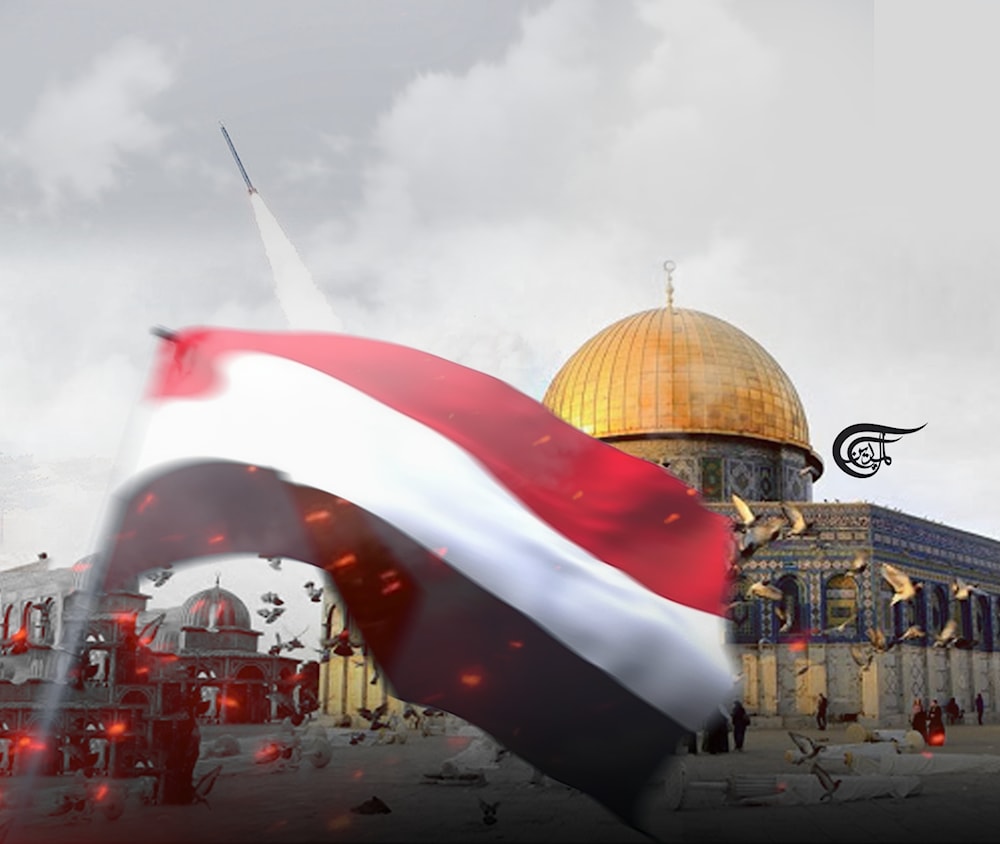The path to al-Quds passes through Sanaa
Yemen has once again affirmed its sovereignty in the face of imperialist aggression and has shown that standing with Palestine is not just a turn of phrase or sloganeering.
-

Yemen has persistently opposed Zionism and the forces of imperialism (Illustrated by Hady Dbouk; Al Mayadeen English)
As reports emerge of increased missile and airstrike attacks by the US and UK-led ‘Prosperity Guardian’ task in Yemen, a sense of desperation permeates the air. Similar to the Saudi-led coalition that sought to weaken Yemen since 2014, ‘Prosperity Guardian’ has been exposed as a paper tiger. This new task force comprises a roster of prominent imperialists, including the United States and the United Kingdom, alongside their enfeebled and subservient client states, such as Denmark, Australia, Norway, and Greece. Even the isolated and defeated Bahrain is a member of this task force, which shows that the forces of normalization have not yet been entirely overcome, despite their weakened state. Another fissure in the foundation of this task force is evident in Italy and France’s refusal to participate in the bombing of Yemen. The Americans themselves have conceded that their attacks on Yemen are unlikely to deter the Yemeni Armed Forces and Ansar Allah. Despite these factors, one aspect worthy of acknowledgment is the aptly chosen name of the new task force; it aligns with their objective of defending the prosperity of the Zionist regime; prosperity built upon a mass grave of Palestinians and other Arabs.
Nevertheless, the small yet mighty Yemen has elevated the boycott, divest, and sanction movement to new qualitative heights by leveraging its geostrategic position to block all ships passing through the Red Sea to Zionist ports. The repercussions are tangible within the Zionist colony; as reported by different media outlets, “Israel’s only Red Sea Port, at Eilat, reported an 85 percent drop in activity since the attacks began." Overall, marine traffic passing through the Red Sea has declined by 44%, and the longer the Ansar Allah movement sustains its pressure, the likelihood of a significant economic impact on "Israel" increases.
Prior to October 2023, “Israel” was making strides in the liquid natural gas market, endeavoring to become the leading supplier in the Eastern Mediterranean. The Yemenis have essentially discarded the aspirations of the Zionists. Accustomed to hardship, the Yemenis show bravery and steadfastness through their assaults on the Zionist economy. Echoing the sentiments of Hezbollah Secretary-General Sayyed Hassan Nasrallah, all of those who have perished in these battles since October are considered martyrs on the path to al-Quds.
Yemen has persistently opposed Zionism and the forces of imperialism, and in this article, a closer look at their history and present will show that the path to al-Quds passes through Sanaa.
Until 1990, Yemen was split in two. The north was the Yemen Arab Republic (YAR) and the south was the People’s Democratic Republic of Yemen (PDRY). Although the history of the two Yemens was full of internecine struggle and imperialist machinations, the people in PDRY enjoyed a high standard of living. Medical services were of high quality, with assistance from Cuban revolutionary doctors, and educational services were also of a high caliber as well. South Yemen also received aid from the People’s Republic of China in the manufacturing and industrial sectors. One example of this is the Mansoura Spinning and Weaving factory, a place where hundreds of women worked. In the realm of women’s liberation, the 1974 Family Law passed in South Yemen played a pivotal role in enabling women to achieve significant strides socially and economically. Similar to East Germany, where women’s participation in the labor force empowered them elsewhere in society, many women professionals in Yemen were beneficiaries of the socialist policies of the PDRY. In regards to their foreign policy, the PDRY remained steadfastly pro-Palestinian.
The PDRY was established by the Yemeni National Liberation Front (NLF), which itself emerged from the Movement of Arab Nationalists (MAN) founded in Beirut in 1952. Notably, the PFLP and DFLP also originated from the MAN and adopted a socialist orientation, while continuing to advocate for Arab nationalism and unity. According to an article in Jacobin Magazine by Helen Lackner; this is the historical context
Within its limited means, the PDRY gave practical support to Palestine. In 1971, it allowed the PFLP to attack an Israeli ship in Bab al-Mandab. Two years later, it closed Bab al-Mandab to Israeli shipping to assist Egypt in the October war.
As we see, Yemen has consistently leveraged its geostrategic position to support the Palestinian cause and deal blows to the Zionist regime. On the international stage, PDRY provided sanctuary to five prisoners from the Red Army Faction in Germany following their actions against their own imperialist government. When the Zionists invaded Lebanon in 1982, both the YAR and PDRY welcomed Palestinians into their populations, and military training camps were established in both capitals to sustain the Palestinian armed struggle against Zionist colonialism. After unification, the Saleh government maintained relationships with all factions of the Palestinians and established civil society groups that raised funds for the protection of Islamic sanctities in Palestine.
According to Lackner, since 2015, the UAE, Saudi Arabia, and the Western-backed Southern Transitional Council (STC) have maintained relations with the Palestinian Authority, while Ansar Allah has forged ties with Palestinian Resistance factions, such as Hamas and Palestinian Islamic Jihad. While Lackner downplays the sincerity of Ansar Allah (she argues that they only support Palestine to counter domestic unpopularity), she also highlights that “[i]n Yemen and the wider Arab and Muslim world, ordinary people are noticing that the Houthi movement is the only one taking action against Israel."
This action is noteworthy, and though it is a far cry to say that Ansar Allah are the political descendants of the socialist revolutionaries of the PDRY, there is a certain anti-capitalist political realism in their actions against the Zionists. By shutting down the Red Sea for Zionist-affiliated ships, the entire world economy is affected. Many shipping companies have decided to divert traffic thousands of nautical miles through the Cape of Good Hope in the southern tip of Africa. Much of the “just-in-time production” that dominates the world economy cannot keep up with these delays and diversions of course.
Yemen has once again affirmed its sovereignty in the face of imperialist aggression and has shown that standing with Palestine is not just a turn of phrase or sloganeering. Yemen is affirming its Islamic duty to defend the sanctities of Palestine and is proving to the whole world that Yemenis are not afraid to strike the Zionists where it hurts.

 Hanna Eid
Hanna Eid
 6 Min Read
6 Min Read











